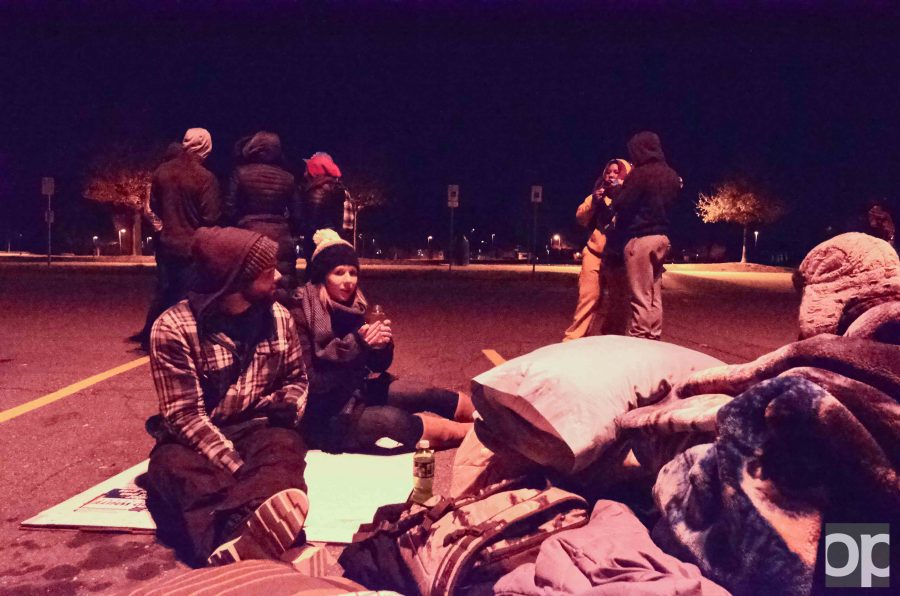The issue of homelessness brought to OU’s attention
Student Advocate of the Health and Science class spent a night in parking lot 2 to ‘fight the night’ and understand the struggles of the homeless.
To fight the night, one must remain in the November cold for 12 hours with only two meals and sheer will to make it through.
Fight the Night is a student-run event created to simulate the harsh conditions that are daily struggles for the homeless. Participants were given sack lunches, a lighted parking lot and boxes for shelter against temperatures diving as low as 35 degrees.
An estimated 40 people were at the event when it started. It was specifically held to benefit and support the Baldwin Center, located in Pontiac, Michigan.
Organizers ensured that every aspect of the night held intense symbolism for the struggles faced by the homeless.
From the cardboard boxes people could barely sleep on to the sack lunches reminiscent of what’s given at homeless shelters, there was nothing that could be seen as real comfort. There was nothing that made the night bearable except the inevitability of going to a warm bed at its end.
As for me, I’m both ashamed and enlightened by my experience that night.
It was my original intention to stay for the whole night and experience some of what homelessness entails. But as the temperature dropped, and the prospect of a night without sleep began to set in, I took my first chance to leave.
I spent the entire following day trying to justify what I did. I might’ve damaged my feet, since I couldn’t feel them just before I left. I needed to get a full night’s sleep, since I must maintain a regimented sleep schedule to minimize symptoms of an illness I have.
But if I were to say there was nothing that justified my quitting before the end of the night, I would be missing the point entirely. Everything justifies avoiding a night on the streets. And more importantly, there’s absolutely nothing that justifies abandoning the people who find themselves there.
After that humbling experience, I realized I couldn’t make it in that situation. And imagining the turbulent minds scarred from domestic abuse, combat-related post-traumatic stress disorder and other causes of homelessness, I realized I honestly don’t know how I could ever make it through a situation like that.
As of January 2015, it was estimated that over half a million people in the U.S. were homeless on any given night, according to the National Alliance to End Homelessness. Nearly half of that figure was composed of families with children.
The most common causes of homelessness are sudden, traumatic life events, according to HomeAid America, a nonprofit provider of housing for the homeless. HomeAid also cited addiction, mental illness and adverse effects of combat trauma as significant factors in homelessness.
The people who participated in Fight the Night were made aware of such factors of homelessness. Speakers throughout the first hours gave these sobering statistics, along with knowledge of how close the problem was to Oakland University’s students with the specific demographics of Oakland County’s homeless population.
The biggest challenge for overcoming homelessness in arguably the wealthiest county in Michigan is the invisibility of the issue. Many people are unaware of the problem around the most affluent downtown areas.
The disparity between available beds in Oakland County homeless shelters and estimates of the homeless population, as stated by one of the speakers, leaves many on the streets.
As the temperatures continue to crawl to the normal Michigan winter, many homeless people will find themselves in even worse weather than students experienced.
The purpose of this article isn’t to say that you’re privileged in any way. College students are stressed enough already. So what’s the point of asking you to do anything more?
Sometimes the point isn’t to do anything other than give people a smile. Maybe you don’t have change, and that’s OK. Maybe you find you have an extra dollar. A bag of chips may mean nothing to you, but it would mean the world to someone who hasn’t eaten that day.
As much as this article should be filled with the pleas for money, time and energy, I know those are the three things all college students wish that they had more of.
So if you have extra blankets, clothes or food, give them away. If you have the energy to smile and give a “How are you?” give that away. And maybe, if you have time, they’ll give you something in return. It could be a story. It could be a compliment. It could be anything.
And when the time comes that you’ve finished all the hard work college asks, and you have more to give and more of a desire to help, unfortunately, there will always be an opportunity for you to do that.
While the event is over, the Baldwin Center is still asking for donations to help reach the goal of $5,500. All of the proceeds will go toward feeding, clothing, educating and empowering those in nee.. To donate, visit www.crowdrise.com/fight-the-night.









